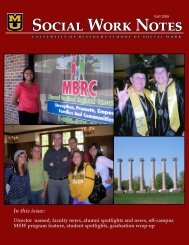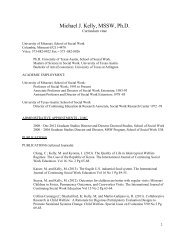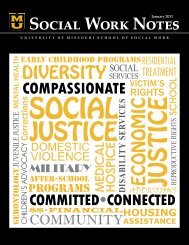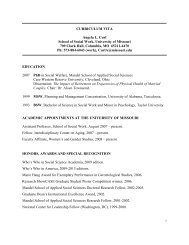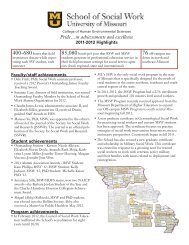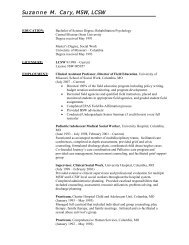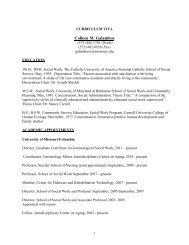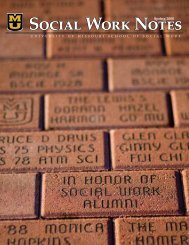Social Work Notes Social Work Notes - School of Social Work
Social Work Notes Social Work Notes - School of Social Work
Social Work Notes Social Work Notes - School of Social Work
Create successful ePaper yourself
Turn your PDF publications into a flip-book with our unique Google optimized e-Paper software.
Alumni Spotlight<br />
Richards puts MSW to work in the hospice field<br />
Paula Richards, MSW ‘82, LCSW, has<br />
been in the hospice field for 19 years<br />
and currently works in Columbia as a<br />
bereavement social worker for Missouri<br />
River Hospice, a Walgreens Company.<br />
She became interested in social work<br />
after earning her bachelor’s degree in<br />
psychology/sociology and while she<br />
worked in foster care, adoption and<br />
protective services for eight years.<br />
After earning her MSW, she wanted<br />
to get into health care. Margie Sable<br />
(now director <strong>of</strong> the <strong>School</strong> <strong>of</strong> <strong>Social</strong><br />
<strong>Work</strong>) was her field instructor at the<br />
University <strong>of</strong> Missouri Hospital. In turn,<br />
Richards has worked with students<br />
completing field programs, too.<br />
Richards grew up in a “three-generation<br />
funeral home in Rolla”, and both parents<br />
(Paul and Mary Null) were always “social<br />
<strong>Social</strong> worker Paula Richards, MSW ‘82, listens<br />
intently to a client. (Photo by Diane Davis)<br />
8 | <strong>Social</strong> <strong>Work</strong> <strong>Notes</strong><br />
work-like” with “big hearts,” Richards<br />
said. “They set a wonderful example, as<br />
they were always so community-minded<br />
and willing to help others in need.<br />
“I had a comfort level with people who<br />
were grieving,” so the transition to<br />
social work and hospice was natural,<br />
Richards said. “Once I was in hospice,<br />
I felt like, oh, this is my niche.”<br />
“Hospice started in the U.S. in the ‘70s but<br />
wasn’t well developed,” Richards said.<br />
After Medicare developed a certification<br />
program for hospice, it became more<br />
commonplace. Hospice programs have<br />
evolved toward having more qualified<br />
social workers, who are important<br />
members <strong>of</strong> the hospice interdisciplinary<br />
team. <strong>Social</strong> work services for patients and<br />
their families focus on psychosocial and<br />
practical needs. Bereavement services are<br />
also required as part<br />
<strong>of</strong> Medicare hospice,<br />
and minimum requirements<br />
for these<br />
services have become<br />
more mandated.<br />
For hospice families<br />
and others in the<br />
community, Missouri<br />
River Hospice<br />
<strong>of</strong>fers grief support<br />
groups, candlelighting<br />
ceremonies,<br />
etc., to help grieving<br />
families. “Our hospice<br />
program always<br />
<strong>of</strong>fers bereavement<br />
services following<br />
our patients’ deaths,”<br />
she said. They begin<br />
by sending a condolence<br />
note and then<br />
follow up two weeks<br />
later with a letter<br />
explaining bereavement<br />
services. After<br />
4-6 weeks, there’s a phone call and the<br />
<strong>of</strong>fer <strong>of</strong> assistance. Follow-up—including<br />
mailings <strong>of</strong> grief literature, visits, phone<br />
calls, a survey and activities—continue<br />
as desired for 13 months to get past the<br />
anniversary <strong>of</strong> the family member’s death.<br />
“People pick and choose what they<br />
want. We try to provide a wide variety<br />
<strong>of</strong> opportunities for bereavement education<br />
and support for people experiencing<br />
normal, healthy grieving.” Richards<br />
said. “I love working with kids, too—<br />
children and grandchildren. We have<br />
a grief board game that really helps to<br />
get kids talking about their feelings.”<br />
If there are unusual circumstances such as<br />
serious depression in adults or children,<br />
referrals to mental health pr<strong>of</strong>essionals<br />
in their community are encouraged.<br />
“THIS is my niche! We’re in<br />
this because we like<br />
helping others.”<br />
—Paula Richards, MSW ‘82<br />
When Richards made the ‘Would<br />
you like a visit’ phone call to<br />
Sally Silvers, one <strong>of</strong> her clients, she<br />
“was very open to the <strong>of</strong>fer.”<br />
Silvers said, “Paula left a message and I<br />
called her back, and she was so sincerely<br />
happy that I called her back!” Somewhat<br />
skeptical <strong>of</strong> surveys, Silvers said, “The<br />
survey was so important because it<br />
wasn’t your typical survey. It’s like each<br />
question was about what I was feeling,<br />
which made me feel so normal.”<br />
When Richards came to visit, Silvers was<br />
very impressed because she’d actually<br />
“read my answers and remembered them!<br />
She told me I was doing really well, which<br />
was very, very reassuring. Paula let me be<br />
me, before I knew who ‘me’ was. She not<br />
only listened and didn’t pass judgment,<br />
but she gave me permission to behave how



